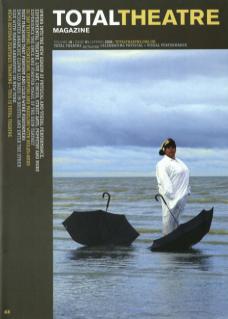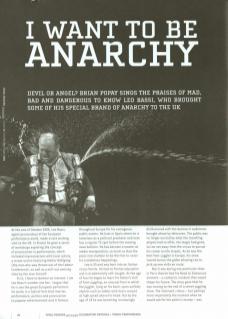At the end of October 2005, Leo Bassi, agent provocateur of the European performance world, made a rare working visit to the UK. In Bristol he gave a series of workshops exploring the concept of provocation in performance, which included improvisations with local artists, a street action featuring Walter Wolfgang (the man who was thrown out of the Labour Conference), as well as a sell-out evening show by the man himself.
First, I have to declare an interest. I am Leo Bassi's number one fan. I argue that he is one the great European performers. He works in a hybrid form that marries performance, politics and provocation to popular entertainment and is famous throughout Europe for his outrageous public events. He lives in Spain where he is notorious as a political prankster and even has a regular TV spot before the evening news bulletin. He has become a master at media manipulation, so much so that the press now clamber to be the first to cover his scandalous happenings.
Leo is 55 and was born into an Italian circus family. He had no formal education and is academically self-taught. At the age of four he began to learn his father's skill of foot-juggling, an unusual form in which the juggler, lying on his back, spins unlikely objects such as tables and chairs around at high speed above his head. But by the age of 18 he was becoming increasingly disillusioned with the decline in audiences brought about by television. The public was no longer excited by what the travelling players had to offer; the magic had gone, so Leo ran away from the circus to pursue his career on the streets. As he was the best foot-juggler in Europe, his show toured across the globe allowing Leo to pick up new skills en route.
But it was during one particular show in Paris that he had his Road to Damascus moment – a cathartic incident that would shape his future. The story goes that he was coming to the end of a street juggling show. The imminent climax – but perhaps more importantly the moment when he would ask for the public's money – was suddenly interrupted. From behind the crowd there was a loud crash. A cyclist had been hit by a car and, as one, the audience about-turned to see what had happened. All interest in Leo's show evaporated. It was clear that a potential death scene was a lot more riveting than any amount of clever juggling tricks.
Leo pondered on this event and concluded that there had to be a lesson somewhere for him, and he realised that it was this: that taking risks, even flirting with death, is still a central tenet of the theatrical ritual, not only having a resonance in primitive cultures but still retaining a magical attraction for modern participants. He decided to inject an element of danger into his own performances. He would now start each of his juggling shows with a mock car crash, in which a friend would deliberately knock him over. A crowd would gather to hear Leo hold bizarre conversations from under the front wheels. He then started his show proper.
From that moment Leo's performances always included the risk factor – he was bad, mad and dangerous to know, and audiences flocked to see him and willingly put themselves in danger too. He went through a phase where he would smash up huge watermelons with an absurdly oversized sledgehammer, resulting in the front row getting drenched with the exploding flesh of the water-filled fruits, and of course they loved it. Over the years, his shows have become more political, and as the entertainment element takes a lesser role, so the provocative ingredient occupies centre-stage.
In 2002 I attended his show in Moscow. Halfway through, Leo brought on cans of petrol and a lighted taper. He told the audience that the doors were locked and that he was about to perform the ultimate theatre show. The international press coverage he longed for would be assured because he was about to set fire to the building and everyone in it. The audience laughed nervously, but in fact there was a tangible sense of fear throughout the auditorium. Of course no one was burnt, but, ironically and very tragically, a few months later Chechnyan rebels held the whole audience of a Moscow pantomime hostage. Many people died in that outrage.
In France, at a private festival attended exclusively by State Electricity Union members, Leo was introduced as the EU Minister for Privatisation. To booing and hissing from thousands of indignant comrades he announced that this would be their last gathering, for next year the state industry was to be sold off. He then set up his stall on site and hosted heated debates with the furious workers. Most workers assumed he was for real. Again, Leo proved to be ahead of the game – French industries are now being regularly privatised.
But perhaps his most notorious happening was an interruption of the Spanish TV version of Big Brother. Leo was interested in the public fascination for the series, in spite of the fake reality of the reality show. After discovering that the isolated Big Brother house was situated in the mountains near Madrid, he negotiated with the land owner to rent the surrounding fields. Everything was made legally watertight to avoid the TV company serving injunctions. A notice on his website then invited people to come and camp in the field and within days an instant festival had been created just over the wall from the Big Brother cameras.
A giant scaffolding tower, again with flawless legal health and safety approvals, was erected so that it would overlook the garden and house. From the tower, impromptu performances including Flamenco dancing and amplified readings from George Orwell's 1984 diverted the TV contestants, accompanied by philosophical debates addressing the concept of 'reality’. All this off-camera activity became so noisy and disruptive that the TV company eventually had to ban the contestants from using the garden and film only inside the house.
When the big day of the last eviction came, Leo prepared his own finale. At the precise moment the TV presenter was about to announce the winner of the series, Leo set off a bank of gigantic naval foghorns that had been secretly installed next to the garden fence, each with a deafening fifteen-mile range. The effect was devastating. Inside the Big Brother house, the cast and crew were literally knocked off their feet by the volume, throwing their hands over their ears as the beleaguered presenter tried to scream the result into her microphone. The winner was eventually announced from the peace and quiet of the distant Madrid studio.
So, Leo was in the UK. What would he get up to here? He said he sensed a mood of apathy in our politics, a distinct feeling of gloom and despondency compared with that in Spain and Europe. Interestingly, the one thing he knew about Britain concerned the elderly man who had been thrown out of New Labour's Conference for heckling Jack Straw. It had been really big news in Europe. Perhaps it was a metaphor for our increasingly power-mad government? Was there some way he could use this story in a street performance?
Leo decided to invite the Old Labourite in question, Walter Wolfgang, to Bristol to celebrate the gentleman's life in radical politics. He would be wined and dined and put up in a nice hotel. Leo settled on a format that he regularly employs in his European performances, namely the theatrical bus tour. Accordingly, an open-top bus was hired, decorated with banners publicising the famous celebrity on board with the invitation to ‘Meet the man who said Nonsense to New Labour'. The entourage toured a Saturday afternoon Bristol with live music to tempt onlookers aboard and meet the man himself. Ultimately, a riotous bus-load of partying passengers ended up in the city centre with the occupants spilling out to celebrate Walter's courage and bravery to a bemused Bristol public... A simple piece, using the Instant Victory Tour device favoured by English sports teams, and one that both underlined the heroism of this ordinary man and acted as a reminder that freedom of speech should never be taken for granted.
Leo Bassi is now planning more BassiBus tours around Madrid in the spring of 2006. After previous journeys that have visited normally off-limits locations such as NATO bases and the extravagant houses of right-wing politicians, the next series of events plans to invade the private spaces of well-known criminals and corrupt politicians. It is important to remember that all of Leo's interventions are paid for entirely out his own pocket – he receives no sponsorship or funding. Always playing on the edge, always courting danger and excitement, Leo Bassi will once again invite his audiences to join him on an expedition into the unknown and unpredictable. Danger and thrills are guaranteed.
Roll up, Roll up. The circus is reinvented and back in town.
Brian Popay is a founder member and senior performer with the Natural Theatre Company. He is currently researching and writing a one-man show about Brunel for touring in 2006.
Formed in 1970, the Natural Theatre Company is world-famous for both its indoor and outdoor comic-visual theatre, having played on all five continents in 66 countries. As well as touring worldwide, the company is an essential part of the cultural fabric of its hometown, Bath.
See www.leobassi.com for photos and further information (in Spanish!) on Leo Bassi.


